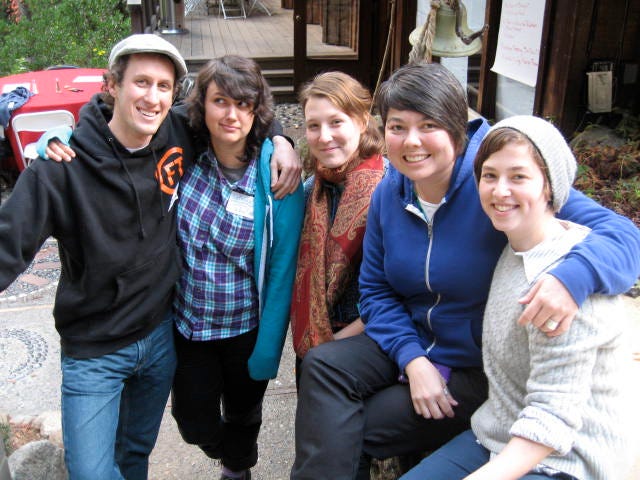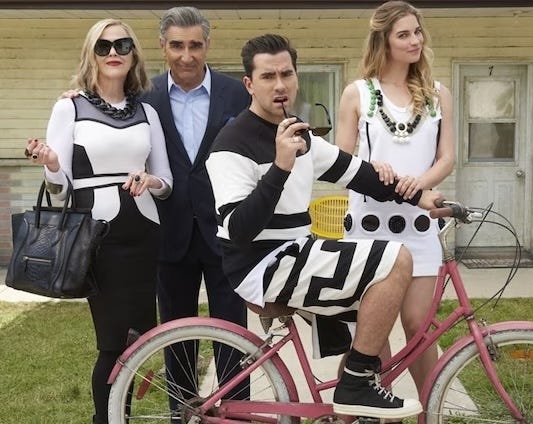Dear Reader
A grab bag of updates, reflections, and nerdy links
Hello Dear Readers,
My eye has been twitching this last week. Even as I write, my eye (or is it eyelid?) is doing a little dance on my face.
I’m not sure what to make of it. Is it lack of sleep, stress, dehydration? My best guess is it’s some sort of reaction to this current moment. In the big scheme of things, an eye twitch is so small. Compared to the floods, wars, and mass migrations, it’s about as benign as the beating wings of a butterfly. Yet I know it’s trying to tell me something. Morse code. Pulsing out a message.
I’ve decided for now that it means I should hold off on sending you another interview. Hold off on filling your inbox with anything that feels like homework or a task or to-do.
Instead, I want to say hello and thank you. Whatever it is you’re handling in your life. Whatever the challenges you are facing. Whatever it is that is making your eye twitch or heart race or keeping you up at night, thank you for doing the best you can in these impossible and miraculous times.
So, as my eyelid flutters, I offer some updates and reflections.
Much love and respect,
Michael
Updates
Thanks to all of you who filled out the recent survey on how you prefer to engage with this material. Turns out, maybe unsurprisingly, that this Substack format was the most popular, with 62% of you preferring it. Next popular was listening to a podcast at 23%, followed by 9% preferring instagram posts. This feedback is already informing what I try next!
Speaking of which, I’ve started sharing short clips from my interviews on Instagram and Linkedin. Check out videos from my recent conversations with Rye Young and Iris Brilliant. More to come!
I’ll be at Resource Generation’s flagship conference Making Money Make Change, Nov 21st-24th in Nashville, TN. I’m facilitating the opening plenary on the lineage of organizing the rich towards justice. For all who don’t know, I used to co-lead Resource Generation and MMMC was my introduction into this work over twenty years ago. If you know young people with wealth and class privilege who may be interested, please share the link and encourage them to attend. I’d love to meet them there.

A grab bag of “Organize the Rich” reflections:
As Rebecca Solnit said, my vote isn’t a valentine, it’s a chess move. This election/our democracy is currently a fight between two factions of the owning class represented by the Democratic and Republican Parties; the right wing/MAGA faction and the neo-liberal faction. Both have populists strands that consistently are overrun by the wealthy donors who are fighting any pro-redistribution, anti-corporate agenda. And yet, (to paraphrase Aurora Levins Morales) we are not choosing our leaders, we are choosing our opposition. There is no greater task at hand than to block the MAGA coalition from gaining control of our government while building the power to win long-term. I love this article on the topic by writer, Aurora Levins Morales, Midnight in the Latrines.
I’ve been talking to more elders! Over the summer I met with a few of the white inheritors who played central roles in the formalization of efforts to organize the progressive rich from the 70s-80s. Leaders like Obie Benz, Jenny Ladd, and George Pillsbury. I loved our conversations and the many stories, articles, and notes they’ve shared from those initial formative decades.
For example: Did you know the very first progressive US inheritor group (and conference) in the 70s was called ARF, which stood for Amalgamated Rich Folks?! And that some folks involved nicknamed it BARF for Beautiful Amalgamated Rich Folks. Omg. Here’s a sneak peak of some of the material I’ve been given (in this case a letter detailing the questions covered in an upcoming ARF meeting). I’m so excited to share more in future posts.
After posting a recent piece, “Organizing the rich is NOT the key project,” my friend Joseph Phelan replied with an engaging set of questions on Linkedin. I appreciated the challenge of answering them and thought you might be interested to learn from them too. One overall reflection from our exchange is that I am still working out how to communicate the centrality of the working class without putting them on an unhelpful pedestal. I don’t want to play into any sort of neo-liberal identity politics where we assume expertise because of experiences of oppression. Do you have thoughts to add? I’d love your insights. Comment directly on the Substack or Linkedin post.
I’ve been thinking a lot about Schitt’s Creek recently and the way that show gives us a picture of wealthy people ‘losing everything’, and coming out the other side more human, more connected, and with more full and interesting lives. I want to catalog pop culture stories that can serve as (completely imperfect) rich people role models. I think Schitt’s Creek gives us a little window into what that can look like. Andor, from the Star Wars universe, is another show I love with a few different rich people role models. We see several characters using their power and position to support the rebel alliance’s fight against an evil empire (sound familiar?). Do you have other pop culture examples of rich people role models or classy class traitors? Add your own in the comments below.
Last week, I was asked, why is there no Bay area focused social justice public foundation like they have in Boston, NYC and LA? I love that question because it gave me a chance to talk about the Vanguard Public Foundation. It was the very first of the social justice public foundations that would become the Funding Exchange (and would spread across the country to cities such as Boston, NYC and LA). Vanguard was founded by a small group of young white inheritors (many from Middlebury College interestingly enough) in 1972. It was a force in social justice philanthropy until it closed its doors in 2011 after a financial scandal. I hope to write a post on this story but for now, if this is a question you have, check out the very first Vanguard annual report here and read a bit about the rise and fall of Vanguard here.


What I’m reading
Rob Stein’s Liberal Legacy by Micah Sifry. A fascinating read and critique of the work of Rob Stein and the Democracy Alliance (DA). The DA has been and is an influential experiment in progressive political philanthropy, and is moving in exciting directions under the leadership of Pamela Schiffman.
The Left’s Fragile Foundations by Robert Kuttner. An incisive argument against progressive movements’ over-reliance on foundations, and for a return to mass membership groups.
Finding Philanthropy’s Forgotten Founder by Darren Walker. A bit of a philanthropy puff piece but also an important and inspiring story to know. Julius Rosenwald (1862-1932), whose money came from Sears Roebuck, was an early social justice philanthropist. We can trace a direct line from him all the way to Resource Generation (RG) and our whole ecosystem of rich people organizing groups today. From Julius and his foundation, the Rosenwald Foundation, to his daughter Edith and her foundation, the Stern Fund… to David Hunter, the ED of the Stern Fund and a key advisor to a whole generation of radical rich kids… to the Funding Exchange, which those same radical rich kids helped found (!)… and finally, thankfully, to Resource Generation, my political for many years! Note to self: This clearly deserves a fun diagram.



I really appreciate your effort to collect and share our movement's lineage, too. I'm excited for more!
Thanks for sharing your reading list, Michael!
I just got hooked up with a copy of new release, Savings & Trust: The Rise and Betrayal of the Freedman's Bank (Justene Hill Edwards). It pulls back the covers on one serious root web of racial inequality in U.S. economic history and sets up a strong case for a federal reparations campaign to compensate depositor's descendants today.
"In the years immediately after the Civil War, tens of thousands of former slaves deposited millions of dollars into the Freedman's Bank. African Americans envisioned this new bank as a launching pad for economic growth and self-determination. But only nine years after it opened, their trust was betrayed and the Freedman's Bank collapsed."